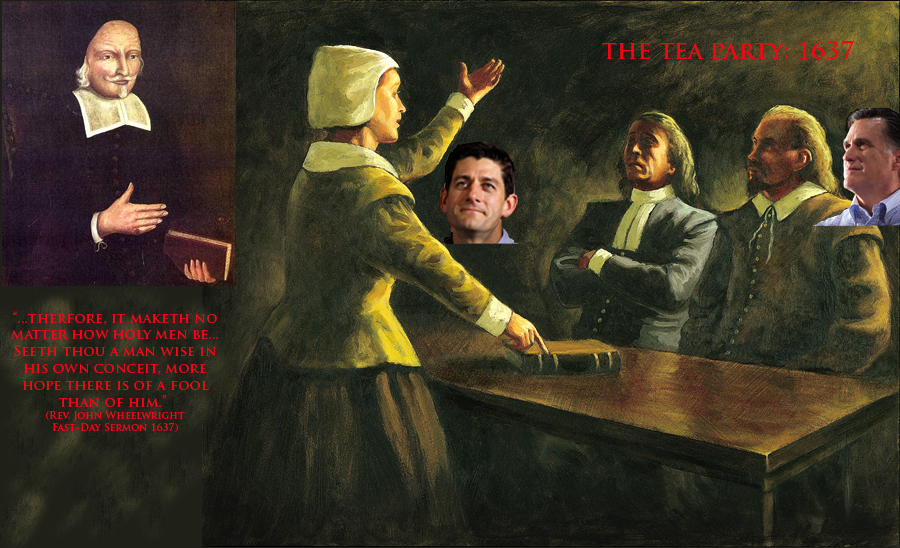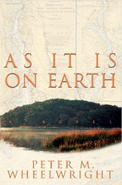In January, 1637, my ancestor, the Rev. John Wheelwright, gave a sermon to his congregation in Boston. His ‘Fast-Day Sermon’ lit a final match to what became known as the Free Grace Controversy (or Antinomian Crisis), and resulted in the Reverend’s and his more famous sister-in-law, Anne Hutchinson’s banishment from the Massachusetts Bay Colony. John Wheelwright urged Anne and her family to accompany him and his congregation north to the ‘Province of Mayne’. Sadly, she instead joined Roger Williams in Rhode Island, and shortly after met her gruesome death at the hands of the native americans in Pelham NY.
The Free Grace Controversy was a dispute over the saving of souls – essentially, whether the path to salvation was a private or public matter. Wheelwright and Hutchinson believed in the Covenant of Grace, the possibility of spiritual grace received by private revelation. They accused their opponents of believing in the Covenant of Works, public gestures sanctified by the religious oligarchs of the Colony (one of whom, John Winthrop – who denied believing in the Covenant of Works – was my wife’s granddad the same number of generations back). Think of The Tea Party in control of the state and one of the myriad reasons to vote for…and cast one’s fate with…Progressive Thinkers.
In As It Is On Earth, the character Zerviah Thatcher recalls my thinly disguised ancestor, and helps Taylor to imagine alternate fates:
The Reverend Littlefield, Mt. Vernon’s Pastor of the Mount, never missed an opportunity in his sermons to point out the stronger Faith of the few radical English Saints that had finally cleared a path into Maine. “For all of us,” he would admonish from his high pulpit, arms spread like a victory eagle, but thin neck rising from his collar like a vulture that had spotted carrion. They had been called by a higher spiritual grace than either the Church of England or the lesser Separatists of the Massachusetts Bay Colony: forty Antinomian Elect – “including your ancestor Zerviah Thatcher” (a discrete nudge in the pew from Esther on behalf of…family) – banished from Boston for apostasy and cast once again into the hands of Providence.
Clinging to the rough edge between the northern forest and the ocean, my forefathers, the last straggling pilgrims, hacked their way “down east” – Governor Winthrop at their backs and French papists from the Bay of Fundy up ahead – before finally settling in worship between the Ogunquit and Kennebunk rivers just north of Portsmouth. It was not much of a Promised Land, but it was good enough to get Maine and the Thatchers up and running.
Whether I like it or not, if Zerviah hadn’t gone wandering with his lord, further than most, into the New England wilderness, I too would be elsewhere. I dwell on this thought.









Cov. of Grace vs Covenant of Works, public gestures sanctified by the religious oligarchs of the Colony
That’s all very interesting, Peter. The C. of Works sounds as if it was a reasonable idea at the time, though. They wanted to set up a structure in their new land, surely: a sort of religious Constitution, and they were a religious group. The Grace idea is the more attractive one to us now, I agree.
If you haven’t yet read it I think you would enjoy ‘Wolf Hall’, by Hilary Mantel, and the second volume, ‘Bring Up The Bodies’. They are about Thomas Cromwell (not Oliver C.), Henry 8th & Ann Boleyn – a sort of historical novel but very good, (both won the Booker).
Thanks for the recommend, Jeremy. In truth, I liked Wolf Hall…but did not love it. Historical novels are less interesting to me than novels about history. No accounting for taste, as they say.
I’m glad I found this blog posting. I’ve never been to your blog before but this article was a joy.
Several years ago I was at the Library of Congress and somehow or other – I wish I could remember how – I came across some documents related to the Antinomian Controversy of the Massachusetts Bay Colony. I ended up submitting an article that was published back in 2007. FWIW you can find the article at http://www.faithalone.org/journal/2007i/4_Brown%20Free%20Grace%20Theology%20in%20Colonial%20America%20edited.pdf
Thank you, Bud…If you enjoy struggling apostates, you should like this book. When asked, I recommend two books on the Free Grace Controversy: ‘The Puritan Ordeal’ by Andrew Delbanco and ‘The Times and Trials of Anne Hutchinson: Puritans Divided’ by Michael P. Winship.
You raise interesting questions, some of which have been on my mind, too. I would expect more social interaction, more engagement, if my siblings and close friends used some of these media, but they don’t. The people I follow on Twitter tend to be writers, journalists and marketers because I am interested in how they use the media and in learning from them by watching listening (lurking?). Some are very chatty and don’t seem to mind sharing all sorts of things with everyone. Others are more obviously purposeful in their tweets promoting causes, websites, products, services. I don’t think they expect to socialize with me for the most part, and my expectations are about the same. When interests converge on occasion and we have a little conversation, that’s nice. Responses aren’t always direct, immediate or obvious, and that’s OK, too. Thanks for listening.
“Historical novels are less interesting to me than novels about history.” – I’m not sure your distinction means anything, Peter War & Peace is uninteresting? I, Claudius, The Red Badge of Courage, The Leopard? They’re all historical novels. You’re also ruling out much of Shakespeare, unless you mean literally ‘novels’…
I would never call those novels “uninteresting”, only less interesting to me than novels that have history qua history (i.e., the discipline) as a kind of character in the story. Glad you’re following my meanderings, JH.
Nose to the ground…
A piece of erudition unlike any other!